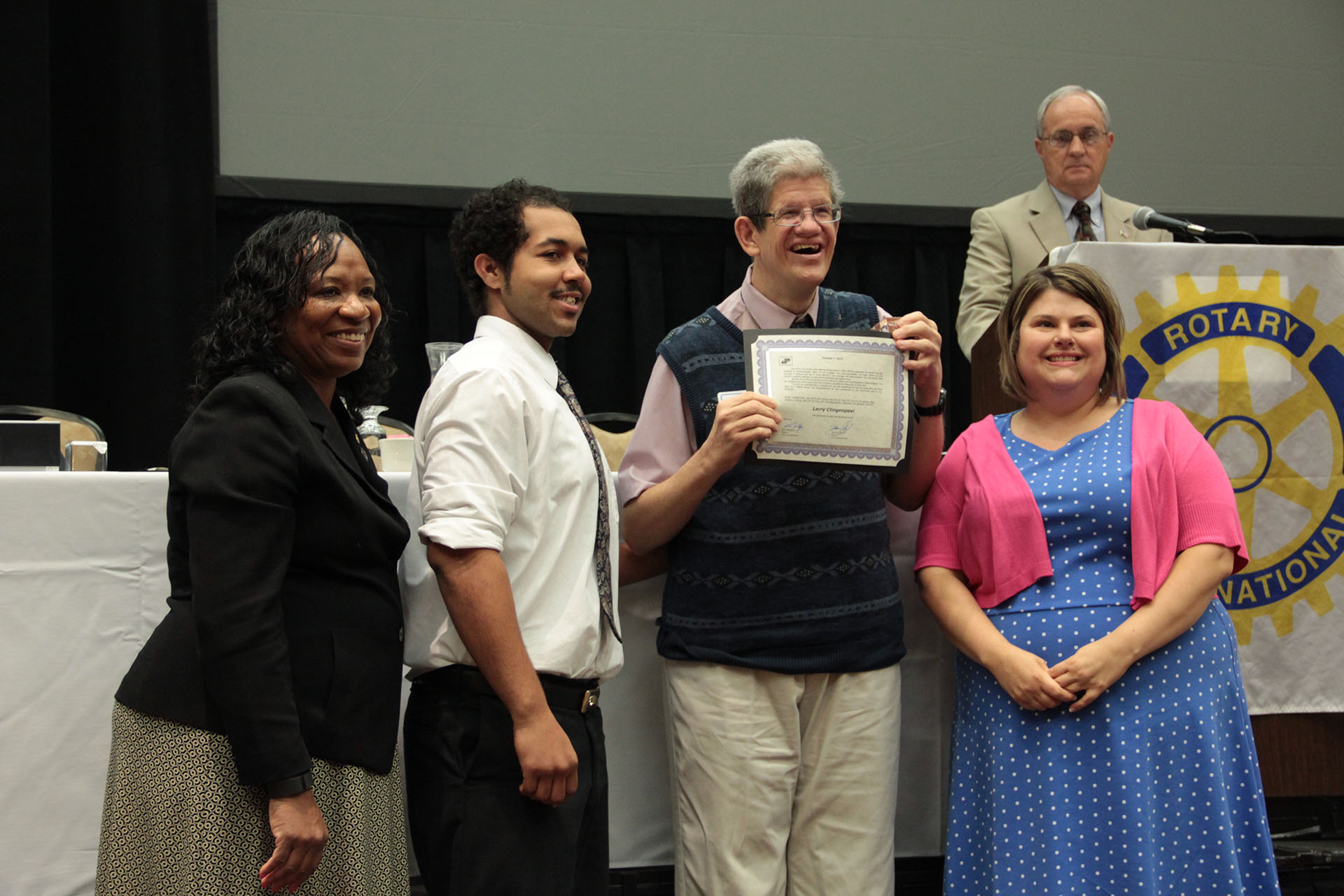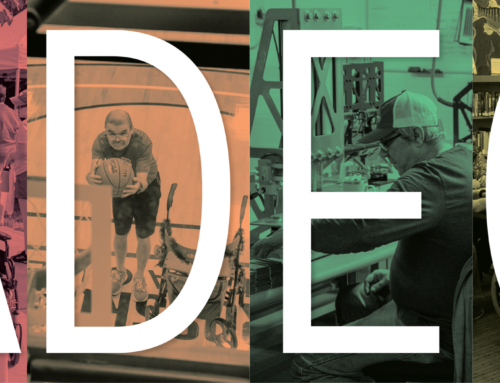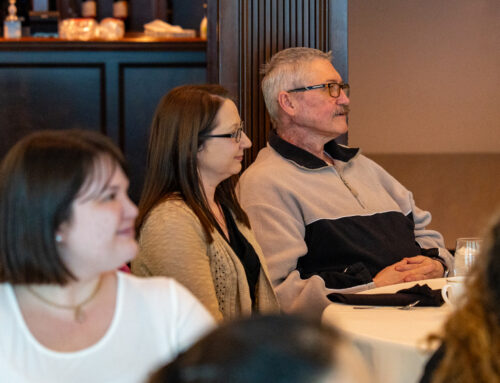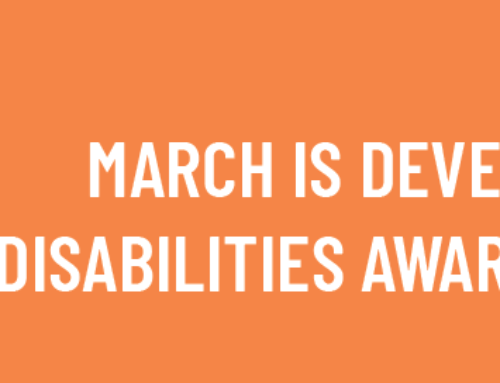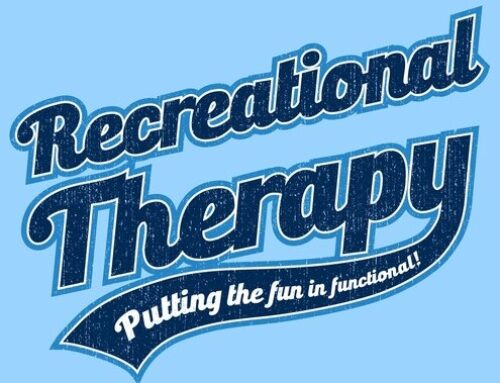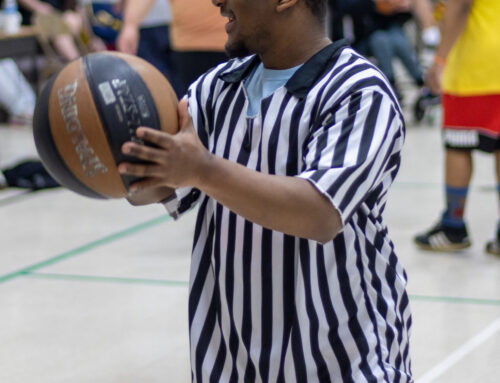Editor’s Note: ADEC Board Member Mary Jo Ogren (pictured above in blue dress presenting certificate to ADEC consumer Larry Clingenpeel) delivered one of two keynote addresses at the 27th Annual St. Joseph County DisABILITY Awareness Luncheon Wednesday, Oct. 7. We were struck by what she shared with the group, and she gave us permission to share her speech here.
Until six years ago, I was a special education teacher. I spent 13 years working like crazy to help my students get through high school. In many cases, that was a pretty challenging feat. So much so, that all of my focus was on the day-to-day realities of their high school career. More than anything, I just wanted to them to graduate. I am embarrassed to admit now that I never gave much thought to what they would do after high school. Sure, I hoped that some would go to college. And I knew that others would head to the South Bend School’s Young Adult Program. But, I never REALLY thought about what the rest of their lives would be like. Somehow I was so focused on the four years that I was with my students that I failed to think about what they would do for the next 60 years.
Ironically, it wasn’t until I left teaching and became an HR Director, that I really began to think about life for my students after high school. My first year out of the classroom was somewhat difficult. I really missed students! So, I began to volunteer with a program that two of my friends had just helped launch- a local Project Search classroom. Project Search is a program that helps young adults with significant disabilities, age 18-22 transition from high school to work. A partnership between ADEC, Voc Rehab, South Bend Schools, and Memorial Hospital, Project Search students spend a full-year gaining real-life work experience by completing internships at Memorial, all the while being supported by a South Bend teacher and an ADEC employment specialist. The goal is that at the end of that year, students will obtain meaningful employment in the community.
That first group of Project Search students taught me so many things! Most importantly, they taught me that all of us deserve the chance to obtain meaningful community employment and that all of us have valuable skills to contribute to the workforce. So, when it was time for those students to look for permanent jobs, our company stepped up and was honored to hire one of the program’s first graduates. Today, three and a half years later, Brandon is still with us and we could not be happier with his work performance, positive attitude, and dedication. We all believe that our company is better because of Brandon. In many ways, he is the heart of Data Realty.
Today we have this year’s Project Search class with us. I would like them to stand so that you can recognize them for all of the hard work they are doing to prepare themselves for community employment at the end of this school year.
What Project Search does is so important! Today, 85% of adults with intellectual disabilities do not have a paid job in the community. And I believe we have GOT to work to change that. As business leaders, we have to work to engage this group of candidates. So, now I take every opportunity that I can to tell other employers about the benefits of hiring employees with disabilities. I want my colleagues to know that while hiring an employee with disabilities is certainly a “nice thing to do” and also “the right thing to do”, it goes far beyond that. There are solid business reasons for actively recruiting and hiring this large, untapped group of talent.
A report by the Institute for Corporate Productivity found that over 75% of companies that hire workers with intellectual disabilities report a positive experience, with three quarters or more rating their employees with disabilities as good to very good on most performance measures including work quality and productivity. In fact, one-third of employers said that the experience of hiring people with disabilities exceeded their expectations and over 40% reported that the challenges they anticipated ended up not being challenges at all. Employers in the study reported that workers with disabilities could be described as dependable, engaged in their work, motivated, with great attendance records, strong attention to work quality, and high productivity. Further, turnover is extremely low. In fact, 50% of employed workers with intellectual disabilities have worked at the same job for over ten years. For these reasons, some of America’s largest companies have fully embraced employees with disabilities. Some examples include Fifth Third Bank, Walgreen’s, and Microsoft.
I believe that if more employers knew the business benefits of hiring people with disabilities, along with the positive impact on culture and diversity, more employers would work towards including them in their hiring plans. My guess though is that many employers don’t know where to start. The first step is to become informed. There are many community resources dedicated to employment services who would be happy to help you- ADEC, Corvilla, Logan Center, Voc Rehab, just to name a few. You can also find a lot of good information online. Finally, you can always contact me. I would be happy to help you get started!
Article by Mary Jo Ogren/ Member of ADEC’s Board of Directors; Director at Graham Allen Partners
Photo by Rod Tackett/ Communication Specialist

